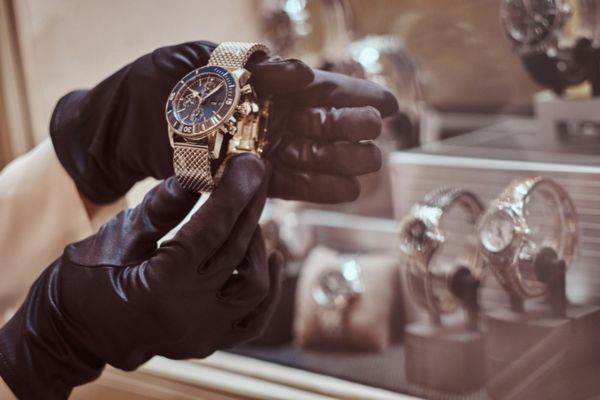Summary
- The origins of the Swiss watch
- Why is Switzerland the country of watches?
- Know-how that has lasted for centuries
- Adopt the elegance of a Swiss watch
You only have to look at a Swiss watch to understand its prestige. Every detail, from the meticulous assembly to the mechanical precision, is evidence of unique know-how. All this is based on a centuries-old tradition that has made Switzerland the country of watches par excellence.
The origins of the Swiss watch
Swiss watchmaking did not establish itself overnight. Indeed, its rise is the result of a long process of evolution, marked by technical advances and the transmission of knowledge. Its history spans several centuries, shaped by cultural, economic and technological influences. As early as the Renaissance, visionary craftsmen laid the foundations of a tradition that would span the ages and conquer the world.
The watchmaking boom of the Renaissance
The rise of Swiss watchmaking dates back to the Renaissance. At that time, the exile of many watchmaking artisans to Switzerland contributed to the emergence of a unique know-how. During the 16th century, the religious conflicts that shook Europe pushed some artisans to settle in Switzerland to pursue their art in peace. In the Geneva region, more and more master watchmakers began to perfect watchmaking know-how, influenced by the rigor and meticulousness sought in the manufacture of high-precision parts. The peaceful environment, political stability and the presence of essential resources greatly contributed to the rise of the Swiss watch.
The evolution towards excellence
The Geneva workshops were then organized around corporations, thus promoting the exchange of techniques and the transmission of know-how that continued to improve. Over time, this tradition spread to other cantons, notably Neuchâtel, the Jura and the Vallée de Joux. These Alpine regions, sometimes isolated, took advantage of their long winters by keeping their craftsmen busy with the meticulous manufacture of watch components. They thus found a way to transform snowy days into a favorable time for the production of pieces that would later supply the great Geneva watchmaking houses. Over the decades, this patient manual work has become the trademark of the Swiss watch.
Why is Switzerland the country of watches?

For centuries, Swiss watchmaking has fascinated and inspired admiration. Its success is not due to chance, but is based on a combination of distinctive elements. Behind this global supremacy lie unique conditions that have enabled Swiss craftsmen to distinguish themselves.
A favorable ecosystem
The question intrigues many enthusiasts who are surprised by this almost insolent success. At the heart of this success, Switzerland is endowed with a stable environment, a long tradition of excellence and a spirit of permanent innovation. These factors, combined with rigorous training of watchmakers, create a fertile ground for the production of high-quality timepieces. In a small country, the watchmaking sector has achieved a feat: transforming a craft into a national emblem and a major economic driver. Even today, Swiss watches travel the world, worn by celebrities, athletes or enthusiasts who swear by the reliability and precision of these technical jewels.
The supremacy of large manufacturers
Renowned manufacturers such as Rolex, Omega and Patek Philippe have relied on a common philosophy, which values quality over quantity. This consistency in demand, ensured by generations of master watchmakers, has consolidated Switzerland's reputation. Even in the 21st century, the idea of having a watch assembled outside this Alpine region can still raise doubts among lovers of fine watchmaking. Prestige lies as much in cultural heritage as in the proven performance of the mechanics. Faced with competition, the sector has been able to modernize while remaining true to its identity. Technological innovations, the use of new materials and research in micro-engineering allow the Swiss watch to remain at the top.
Know-how that has lasted for centuries
Swiss watchmaking is based on refined know-how that has been built up over the centuries. Thanks to a constant search for excellence, it has been able to evolve while preserving its artisanal roots. This constant improvement is the fruit of a long heritage passed down from generation to generation. Between tradition and innovation, each watch is the result of technical mastery and meticulous attention to detail.
Transmission and improvement
During the 18th century, Swiss watchmakers understood that the reliability of a watch depended on the rigor of the gesture and the finesse of the adjustments. The techniques were then passed down from master to apprentice, often within the family. Each stage of production was carefully documented, allowing a heritage of technical recipes to be preserved. The manufacturers continued to innovate: more precise springs, more readable dials, ever more ingenious complications .
International recognition
At the end of the 19th century, Switzerland was already well ahead of its competitors, offering watches that could withstand shocks, temperature variations and the wear and tear of time. This deeply rooted heritage means that even today, the words "Swiss Made" on a dial inspire almost unanimous respect among collectors. It is not only an indication of origin, but a quality label certifying historically proven know-how. According to the Federation of the Swiss Watch Industry , watch production has constantly evolved to better adapt to technological advances without losing sight of the importance of manual work. This subtle alliance between tradition and modernity has forged the reputation of the Swiss watch.
Adopt the elegance of a Swiss watch
Wearing a Swiss watch means being part of an exceptional heritage. There are accessible models for those who wish to enter this world, in addition to highly sought-after collector's items.
Custom watches, such as those of the Mods phenomenon, allow you to obtain a unique creation inspired by Swiss luxury: Datejust , Speedmaster , Royal Oak , etc. With a reliable movement and advanced customization, they offer a modern alternative to traditional watchmaking while respecting its codes.
Swiss watchmaking embodies a unique know-how, combining tradition and innovation. Indeed, more than an accessory, a Swiss watch is a witness to time and refinement.


What is the NH34 movement?
Which luxury watch brand to choose?